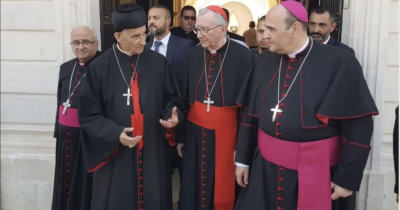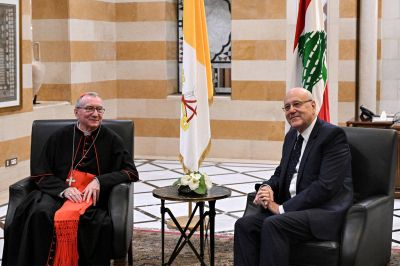
The Holy See's Secretary of State Cardinal Pietro Parolin arrives for his meeting with the Lebanese prime minister at the government palace in beirut on June 26, 2024. (Credit: Joseph Eid/AFP)
After the "spiritual summit" in Bkerke on Tuesday, it wasn't just the boycott by the Shiite community that caused a stir. The absence of two main Christian leaders — Samir Geagea, head of the Lebanese Forces (LF), and Samy Gemayel, head of the Kataeb — from the summit organized for the visit of Vatican Secretary of State Pietro Parolin also drew attention. Their claim that their absence was due to "personal security considerations" has been questioned, especially since Geagea was recently seen publicly in Jbeil with LF MP Ziad Hawat.
"As a security precaution, Samir Geagea does not attend events whose date and place have been set in advance," said Charles Jabbour, the LF spokesperson, to L’Orient Today. "We did not boycott the meeting, since we sent LF MP Pierre Bou Assi" to represent the party.
"Moreover, it was mainly a cordial meeting. There were no political initiatives," he added.
As for Gemayel, who sent MP Nadim Gemayel to represent him, "he never goes to a place whose address and time are predetermined," emphasized the party spokesperson, Patrick Richa, "This is a routine he has adopted for some time and which we take very seriously."
"The Kataeb never boycott meetings in Bkerke, with whom relations are excellent. But it is clear that those in Hezbollah’s good graces move around as they please and attend all the meetings. On the other hand, those who clearly and honestly express bold positions take great risks," Richa added, referring to Gebran Bassil, head of the Free Patriotic Movement (FPM), and Sleiman Frangieh, head of the Marada Movement, both close to Hezbollah and present at Tuesday's summit.
Inter-Christian Tensions
The Bkerke meeting, requested by the Vatican's secretary-general, who was personally sent by the Pope, aimed to facilitate an agreement on the presidential election. This is why, Parolin expressed disappointment at the main Christian parties' lack of unity.
"If you continue down this path and maintain potentially suicidal behavior, it will be the end for Lebanon," the cardinal reportedly told the Christian leaders, according to a source from the FPM.
A close associate of the patriarch told L’Orient Today that Geagea and Gemayel's absence was due to ego issues. "They refuse to meet with other Christian leaders in Bkerke," he said. "It's a misstep that harms the Church and the Christians."
"Some Christian leaders consider themselves indispensable and want the solution to come through them... it's somewhat similar to what they criticize [Speaker of the Parliament] Nabih Berri for," he added.
If Bkerke officials were outspoken, it's because the patriarch was "astonished" by the behavior of the two Christian leaders, which he described as "disrespectful to the Vatican and its high representative," as highlighted by the FPM source.
"The absence of certain Christian leaders is a negative attitude not only towards Bkerke but also the Vatican. A lack of respect for the principle of rapprochement and dialogue" said the FPM in a statement, "How else to explain the refusal of national, Christian-Muslim, and Christian-Christian meetings, if not by a desire to obstruct any resolution and perpetuate the presidential vacancy."
The LF retaliation was quick. In a statement, it denounced the "spokespersons" within the FPM as well as those within "the resistance camp [Hezbollah’s allies]," accusing them of opposing "the national policy adopted by Bkerke by aligning with those who have attacked the Church with the vilest descriptions," referring to the remarks by the Jaafari Mufti, who last Tuesday accused the patriarchate of being "manipulated to serve the interests of Zionist terrorism and global criminality."
Private Meetings
The Pope's envoy met in turn with Gemayel and Geagea between last Sunday and Wednesday, on the last day of his visit. He also met with Frangieh and Bassil. According to reliable sources, these private meetings were kept confidential for “security reasons,” except for the one with Gemayel, held on Wednesday.
"The Kataeb are keen to see the election of a president capable of communicating with all parties," Gemayel said in a statement. During the meeting, which lasted two hours, Gemayel discussed "the paralysis affecting all constitutional institutions, resulting from Hezbollah and its allies' intransigence and their hegemony over Lebanon’s major decisions."
Last Sunday, Cardinal Parolin met with Zgharta MP and former opposition presidential candidate, Michel Moawad. "The Vatican believes that if the institutions are in danger, and primarily the presidency, the entire Lebanese formula would be threatened," a source familiar with the content of the meetings with Christian figures said.
Under the theme of preserving coexistence and the need to rehabilitate the role of "Lebanon the message," a concept dear to Pope John Paul II, Parolin included in his meetings a session with members of the follow-up committee of the al-Azhar Declaration on "Citizenship and Coexistence" (2017) and the "Abu Dhabi Declaration on Human Fraternity" (2019), an initiative by former Prime Minister Fouad Siniora. The al-Azhar Declaration, it is recalled, proclaims that "all citizens are equal in Islam" and eliminates any civic discrimination based on religious affiliation.
"Unfortunately, we are now in last place regarding coexistence. The Vatican is very concerned about this situation and keen to preserve the Lebanese example," Siniora told L'Orient Today, referring to a document committee members submitted to the cardinal. Present at this meeting were former ministers Tarek Mitri and Khaled Kabbani, former MP Fares Souhaid, Mohammad Sammak, a member of the Islamic-Christian dialogue committee, Antoine Messara, former member of the Constitutional Council, and Antoine Courban, author and activist. "The tragedy in our country is that we reap macro-consequences in the presence of micro-ambitions," concluded Siniora.
This article was originally published in French in L'Orient-Le Jour.

